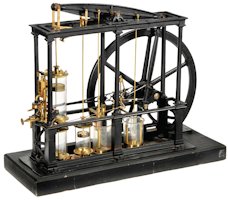
|
Some Common Myths Thought to be True - Myth 100
Myth 100: James Watt invented the Steam Engine
James Watt was born in Greenock on 18 January 1736. His father was a prosperous
shipwright. Watt initially worked as a maker of mathematical instruments, but
soon became interested in steam engines.
The first working steam engine had been patented in 1698 and by the time of
Watt's birth, Newcomen engines were pumping water from mines all over the
country. In around 1764, Watt was given a model Newcomen engine to repair. He
realized that it was hopelessly inefficient and began to work to improve the
design. He designed a separate condensing chamber for the steam engine that
prevented enormous losses of steam. His first patent in 1769 covered this
device and other improvements on Newcomen's engine.
Watt died on 19 August 1819. A unit of measurement of electrical and mechanical
power - the watt - is named in his honour.
|
|
The Scottish engineer James Watt, the inventor of the modern condensing
steam-engine, was born at Greenock on the 19th of January 1736. His father was
a small merchant there, who lost his trade and fortune by unsuccessful
speculation, and James was early thrown on his own resources. Having a taste
for mechanics he made his way to London, at the age of nineteen, to learn the
business of a philosophical-instrument maker, and became apprenticed to one
John Morgan, in whose service he remained for twelve months.
From a child he
had been extremely delicate, and the hard work and frugal living of his London
pupilage taxed his strength so severely that he was forced at the end of a year
to seek rest at home, not, however, until he had gained a fair knowledge of the
trade and become handy in the use of tools. Before going to London he had made
the acquaintance of some of the professors in Glasgow college, and on his
return to Scotland in 1756 he sought them out and obtained work in repairing
astronomical instruments. He next tried to establish himself as an instrument
maker in Glasgow, but the city guilds would not recognize a craftsman who had
not served the full term of common apprenticeship, and Watt was forbidden to
open shop in the burgh. The college, however, took him under its protection,
and in 1757 he was established in its precincts with the title of
mathematical-instrument maker to the university.
|
